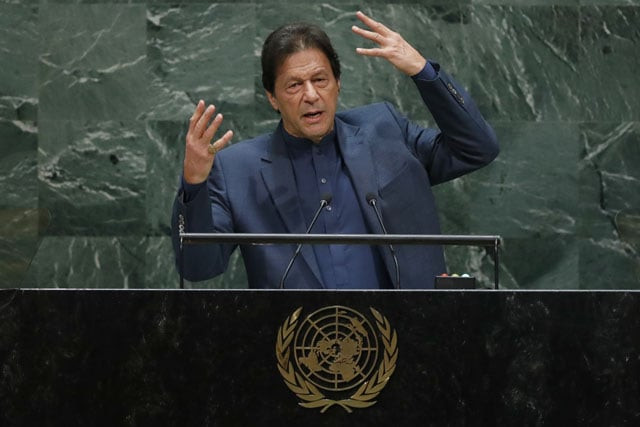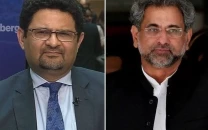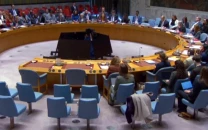Does UN speech signal Imran's arrival as a global leader?
Former diplomats and analysts dissect PM's extempore address to explore what it means for audiences home and abroad

PM Imran Khan addresses UNGA session in New York on Friday. PHOTO: AFP
It may be that Pakistani leaders have traditionally been anaemic at the international stage. It may be that Imran, given his history as one of the top sportsmen of his time, is no stranger to spotlight.
At home at least, the impassioned off-script address he delivered before the international forum has already united his critics and supporters alike in praise.
To them, whatever the premier may lack in terms of a coherent policy vision, he has displayed the ability to consistently dazzle at the international stage. Beyond the extempore speech itself, Premier Imran's current visit to the United States has been chock full of media engagements and public appearances. From interviews with the likes of CNN to addressing the Asia Society, it is safe to say that no Pakistani leader has embarked on a public affairs blitz of this scale.
But does all this herald more than an assertive voice to represent Pakistan's interests abroad? Could it in fact signal Prime Minister Imran's arrival as a global leader on the international stage? Speaking to The Express Tribune, some of Pakistan's preeminent former diplomats and analysts dissected the contents of the prime minister's speech at the UN General Assembly to explore what it signifies for audiences both home and abroad.
Are we [Muslims] children of a lesser god, PM asks world leaders at UNGA
For Pakistan's former foreign secretary Shamshad Ahmad Khan, the prime minister's speech before the world body and his other engagements in the US certainly did suggest an unprecedented shift in Pakistan's strategy at the global stage.
"Imran delivered an unprecedented presentation of our Kashmir stance, especially the current humanitarian crisis triggered by India," he said.
"He raised the issue in the most beautiful way, by placing his entire emphasis was on solving the current plight of Kashmiris and freeing them from the prison Narendra Modi has placed all of them in.
He also praised Premier Imran's move to single out his Indian counterpart for criticism directly. "By again highlighting the parallels between Modi's philosophy and that of Hitler's, he sent a message that the Indian leader cannot escape his past as a member of the fascist RSS," he said.
Analyst Lt-Gen (retd) Talat Masood agreed that Prime Minister Imran, in his speech, clearly defined Pakistan's position on the Kashmir issue. "No Pakistani leader has ever delivered a speech so impassionate, heartfelt and wonderfully articulate at the global stage," he said. "He raised the issue of India's heavy-handedness in Occupied Kashmir very forcefully and effectively."
Pakistan's former high commissioner in India Abdul Basit too was all praise for the Kashmir part of Premier Imran's speech, which he said was 'crisp'. "All of Pakistan's previous leaders, when they had the opportunity to speak before the UN, read from the text.
In contrast to them, in Imran for the first time we had a Pakistani leader speak extempore," he pointed out. "And not just that, it was evident Imran spoke from the heart, with real passion. On the part of his speech about Kashmir, I would give him full marks."
For ex-foreign secretary Shamshad, the fact that Premier Imran was allowed to speak for 50 minutes as against the 10 to 15 minutes for regular General Assembly speeches was in itself a great victory. "The world did want to listen to him. Normally General Assembly speeches are just heard, but Imran's speech was listened to with great interest," he said.
"The excellent way he articulated himself on the environment, corruption, and Islamophobia – all issues that concern the entire world – he has very much emerged as a global leader in the international stage.
'Brilliant speech': PM Imran’s UNGA remarks widely hailed
This is something other international publications, like The Independent, have acknowledged," he added. "I have never seen a speech of such high standards. In my memory, this is one of the best speeches ever at the UN. With it, I feel Imran proved that he is not an individual, he is a phenomenon."
Beyond the speech, Shamshad was impressed with how the prime minister conducted himself at the various other engagements he had in New York. "Even before he delivered the speech, he managed to convince all heads of state he met on Pakistan's position on Kashmir and other issues," he said. "He has very convincingly put the Kashmir crisis at the global radar screen. This is evident from the loud and clear message being sent to India from all international corners."
"Already besides the UN bodies and other global human rights agencies, world leaders now know the gravity of the situation. The US too has very explicitly asked Modi to end the siege in Indian Occupied Kashmir," the ex-foreign secretary pointed out. "With the way, he raised the issue, now the ball is firmly in the international community's court."
Both ex-envoy Basit and Lt-Gen Masood had some reservations regarding the content of Premier Imran's speech, however. "The premier chose to keep his comments regarding Indian Occupied Kashmir at the very end," Basit noted. "Although he dedicated most of his time to it, if I were to advise him, I would have suggested starting off with Kashmir," he said. "I also think he should have spoken more about Afghanistan, given Pakistan's role in mediation on the conflict."
Shamshad suggested an explanation for the choice. "You see, the environment is a world issue. Corruption again is a global problem. What Imran did by beginning his speech with those topics was catch the attention of the representatives of various countries present," he said.
Masood, meanwhile, took issue with the prime minister's mention of the possibility of nuclear conflict with India. Although Imran clearly stressed that his comments on the matter were not a threat but a real fear, the analyst was apprehensive that the world may not see it that way.
"I would personally have avoided emphasising the nuclear aspect while highlighting the threat of conflict between India and Pakistan," he said. "For starters, I think the nuclear spectre takes too much attention away from the plight of Kashmiris. The West gets more anxious about the conflict between Pakistan and India and as a result, focuses more on helping maintain the status quo than actually resolving the Kashmir issue."
How international media covered PM Imran's powerful UN speech
"Secondly, while Imran tried to convince world leaders that he was articulating an actual fear rather than making a threat, they may not necessarily see the comments in that sense," Masood warned. "For them, the comments could be construed as conveying an implied threat," he said.
"As a result, instead of understanding the morality and legality of our investment in Kashmir, they may view Pakistan as an immature and irresponsible state that cannot be trusted with nuclear capabilities."
Regarding the impact of Imran's speech, Basit agreed that it had certainly left a lasting impression on the people of both Pakistan and India. However, he was more cautious commenting on the speech's wider impact on the rest of the world.
"For now, I feel it is premature to say anything. Time will tell what the real impact of Imran's impassion speech was on the rest of the world," he said. "I think we in Pakistan also have to realise that global realities are not commensurate with our hopes and expectations."
As for the way forward, Basit said Pakistan needed now to keep Kashmir on the world's radar with consistency. "The main challenge is to sustain the momentum that Imran's speech has created. We should avoid falling into the trap of complacency," he said. "How we do that depends on how well we build our diplomatic capabilities and capacities."
"During my tenure in the Foreign Office, I recommended time and again the need to have a special envoy on Jammu and Kashmir who can constantly interact with global leaders to present Pakistan's case on the dispute. We also need to strengthen the Kashmir cell in the Foreign Office," the ex-envoy added.
Shamshad and Masood also insisted that Pakistan's domestic crises were linked to its ability to exert any sort of influence when it comes to the Kashmir issue.
"I believe Imran has lived up to his promise of being an ambassador for Kashmiris on the world stage, but the General Assembly euphoria must end and we should return to stark realities," insisted Shamshad. "Our real problems are domestic, not external. Even our external problems are an extension of our domestic failures," he said. "Our internal weaknesses are what elements hostile to us have taken advantage of."
"One vice that has plagued all Pakistani leaders is that they tend to approach the country's problems linearly, rather than comprehensively," noted Masood. "We need to understand that Pakistan's domestic political and economic challenges are linked to the Kashmir issue. Only by fixing them will we be able to exert more influence at the global stage."
‘Govt taking several steps to revive tourism industry’
"The priority should be fixing our country's present messes and presenting ourselves as a peace-loving responsible nation to the world. The wider Kashmir issue is one for the long haul and will only be resolved when we are able to engage from a position of strength," added Shamshad. "We must persist in our principled position, but this requires us to be strong economically and stable politically. No dependencies, economic or political."
Masood also suggested that eventually, Pakistan would need to work out some way to engage with India. "At some point, perhaps years down the line, our leadership also needs to think about how it can develop a working relationship with India, no matter what challenges we currently face," he said.
"It would be unwise to get too carried away with our current policy of antagonism towards India. Such a policy cannot be followed forever," he added. "Somewhere down the line, we will need to see how we can strike a balance in order to have some influence on India."


















COMMENTS
Comments are moderated and generally will be posted if they are on-topic and not abusive.
For more information, please see our Comments FAQ